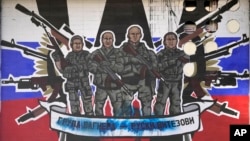The Washington, D.C. Post newspaper says that in the leaked intelligence documents on the Wagner Group, there is "little in the trove to suggest that the CIA, Pentagon or other agencies have caused more than minor setbacks for Wagner over a six-year stretch during which the mercenary group, controlled by Putin ally Prigozhin, gained strategic footholds in at least eight African countries."
Indeed, the Post asserts that "Overall, the trove portrays Wagner as a relatively unconstrained force in Africa, expanding its presence and ambitions on that continent even as the war in Ukraine has become a grinding, if not all-consuming, problem for the Kremlin."
Recent reporting in The Wall Street Journal said the mercenaries recently offered heavy weapons, including shoulder-fired anti-aircraft missiles, to the paramilitary Rapid Support Forces currently engaged in unrestrained combat with Sudan's national army. The newspaper said the RSF declined for the present due to concerns about a U.S. reaction, but left open the possibility of receiving arms in the future.
In Sudan, the Post says Wagner owner Yevgeny Prigozhin, a Putin ally, offered to be Khartoum's "peacemaker."
“To help resolve the existing conflict and for Sudan’s future prosperity, I am ready to mediate” Prigozhin said in a statement published on the Telegram social media platform. The Wagner boss said he would send relief planes with medical supplies and “everything needed for the people who are now suffering.”
US Secretary of State Antony Blinken warned Monday that Russia's Wagner mercenary group risked aggravating Sudan's conflict.
"We do have deep concern about the engagement of the Prigozhin group -- the Wagner group -- in Sudan," Blinken told a news conference, referring to the Kremlin-linked outfit's founder Yevgeny Prigozhin.
Blinken said Wagner - which has been active in Mali and the Central African Republic as well as in Russia's invasion of Ukraine - "simply brings more death and destruction with it" wherever it is involved.
Tripoli-based Sadeq Institute "think tank" director Anas El Gomati is quoted by the Post as saying the Russian hired guns as “a solution to the kind of problems that African dictators find themselves in: Democratic pushback? No problem. We’ll help you with that, whether it’s tampering with ballots, or whether it’s literally fighting brutal kind of insurgencies like they have in [the Central African Republic] and in southern Libya.”
El Gomati added that Wagner offers options for sanctioned regimes, saying “If you’re suffering trying to get your resources and minerals out of your country, ‘not only can we [Wagner] bring [those] services to you, but we’ll put those dollars in your bank and no one will be any the wiser’ — because they operate these massive networks of shell companies.”
The Post says that according to the intelligence documents leaked, Wagner and related concerns of owner and Putin ally Yevgeny Prigozhin have ramped up Africa operations in recent years, and along with that, expanding both its ambitions and ability to exert authority.
Prigozhin is “shifting his approach from taking advantage of security vacuums to intentionally facilitating instability,” according to one of the leaked documents cited.
The intelligence papers indicate, according to the Post, that "Prigozhin’s “aggressive agenda,” intends to offset French and U.S. influence in Burkina Faso, Eritrea, Guinea, Mali and other countries, as well as Wagner’s direct support for a coup plot in Chad by setting up a cross-border training compound for rebels."
CIA Director William J. Burns, in February remarks at Washington's Georgetown University, said Wagner “is expanding its influence in … Mali and Burkina Faso and in other places, and that is a deeply unhealthy development and we’re working very hard to counter it because that’s threatening to Africans across the continent.”
Murithi Mutiga, African Program Director at International Crisis Group, says Russia - including through Wagner Group, is exploiting what may have been seen as U.S. disinterest in Africa and its issues.
“There’s certainly a perception on the continent that following the end of the Cold War, the U.S. became less interested in the continent, only perceiving it as a place where it could engage in humanitarian activity, maybe apply some pressure for democratization, but not really engage in a meaningful way. And that opened up a gap for others,” he is quoted in the Post as saying.
This report was prepared from an exclusive article in the Washington Post and from reporting by The Wall Street Journal and Agence France-Presse.
